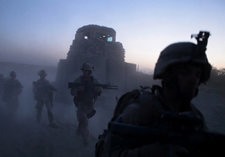(Originally published on blogcritics.org)

I put off viewing Hell and Back Again because I was expecting a heavy-handed anti-war diatribe. What I found, however, was a creative and intimate portrait of one of our nation’s warriors.
The documentary takes us along with 25-year-old Sergeant Nathan Harris on two journeys. The first journey places us with Harris’ Marine infantry company in Afghanistan where they hunt theTaliban and try to connect with the local population. The second journey admits us to Harris’ family in North Carolina, where the struggles are more complex. Harris confronts the physical and emotional difficulties of re-adjusting to civilian life with the love and support of his wife, Ashley, and the devastating impact a Taliban machine-gun bullet had on his leg.
Photojournalist and filmmaker Danfung Dennis was embedded with E Company, 2nd Battalion, 8th Marine Regiment in Afghanistan. He could have taken the easy and safe route of first showing us Harris in Afghanistan, then following him home to the United States. If he had done that, the quality of the reportage would have still made this a good film. What he did do was surprising and makes this film exceptional and worth seeing, even if you “never watch documentaries.”

Dennis and editor Fiona Otway intertwine the two stories in a manner that sheds light on both. At first this is somewhat disorienting as the film switches between the dust of Afghanistan and the flowers of North Carolina. Once the viewer understands what is happening, the visual poetry they create begins to be appreciated.
Some examples: From the WalMart where Nathan ponders whether to buy Call of Duty IV, the film cuts back to his company securing a village in Afghanistan, then back to a screen shot of the game in which Nathan plays a “secure the town” scenario. Later, Nathan talks with a village elder in an Afghan town, offering to share medicine, pain killers, “like aspirin, not narcotics.” Then the film cuts to a Department of the Navy Pain Management Clinic were Nathan talks with a doctor about the dangers of addiction to pain killers. There are many such transitions. This is very well done.

One personal note: Dennis filmed a couple of sequences in which Harris toys with and otherwise goofs around with weapons. As I watched, I couldn’t help think, “This will really freak the anti-gun wimps who watch this.” I spent 30 years around government-issued weapons. Harris always took proper precautions before playing with the guns. Don’t be scared, anti-gun boy.
Hell and Back Again is neither an anti-war film nor a patriotic white-wash of a nasty war. Dennis accomplishes a difficult exercise in integrity, doing what a filmmaker should. He shows us a part of the world and a part of someone’s life we would not otherwise have seen. More importantly he allows us to experience it in such a manner that indicates he has a respect for our intellect and judgment.
The film’s tag line is “lays bare the true cost of war.” If you were in the military, you already know the cost. If you were not, this film introduces you to someone who is paying the price.
Hell and Back Again, winner of 2011 Sundance awards for Documentary and Cinematography, opens October 5 in New York at the Film Forum and in Los Angeles at the Laemmle Monica on October 14. And a surprise treat for country fans: J. Ralph’s score and lyrics are performed by Willie Nelson.




